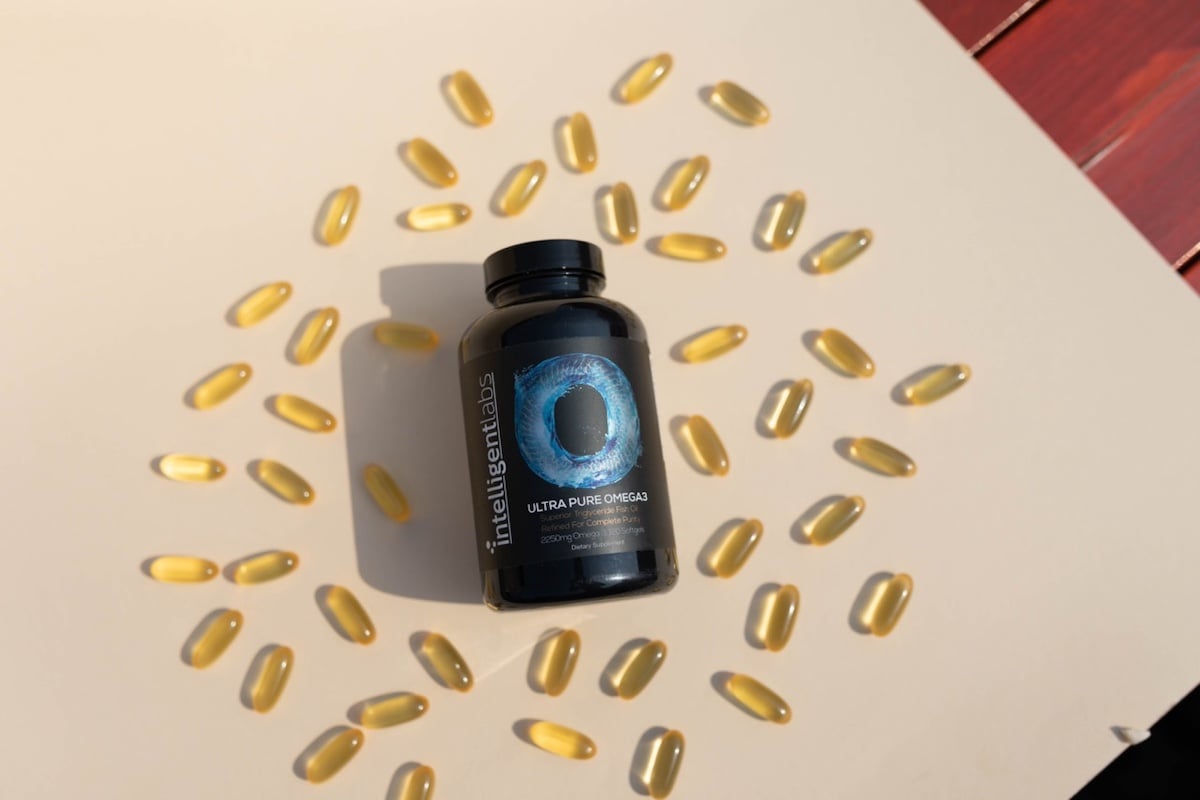In recent years, diabetes has reached epidemic proportions. Globally, it is estimated that 387 million people are living with diabetes and the number is expected to rapidly rise in the coming years. Diabetes is a chronic and dangerous disease, and it is becoming almost expected that developing it is a part of growing older, just like going grey. However, it doesn’t have to be this way, as the latest research is clearly showing. Let’s find out how omega-3 helps with diabetes.
The role that diet and lifestyle play in the development of diabetes is not very clear. In fact, you can even go as far as saying that diet and lifestyle are the cause of type II diabetes. One of the key dietary components in avoiding and treating diabetes is the level of omega-3 fatty acids in your diet.
Table of Contents
The two types of diabetes
Diabetes, by plain definition, is a condition where insulin production or efficiency is impaired. The way in which the insulin function is impaired depends on the type of diabetes and there are two types:
Type 1 Diabetes
Also known as Insulin-Dependent Diabetes Mellitus, this is normally found in children and is predominately caused by genetics. With this type of diabetes, the immune system has destroyed the beta cells in the pancreas that produce insulin. The body is then no longer able to utilize glucose because the glucose cannot enter the cells without insulin and this causes blood sugar to be high. The main treatment for Type 1 diabetes is insulin injections.
Type 2 Diabetes
This type is, by far, the most common. It’s characterized by cells becoming less sensitive to insulin, a condition known as insulin resistance, which means the cells can’t interact with glucose to properly absorb it and utilize it for fuel. In response, the pancreas will often increase insulin production, which leads to fat deposition by driving excess glucose into cells.
The excess demand placed on the pancreas over time may cause metabolic damage, exhaustion and inflammation, which leads to a loss of function and a reduction in the amount of insulin the pancreas can produce. Then you have the very nasty and dangerous situation of too much blood glucose, too little insulin, and reduced sensitivity of the body’s cells to that insulin.
Type 2 diabetes can be caused by genetics, but is more often caused by lifestyle and diet. The treatment is a mixture of medication, specialized diets, lifestyle changes, and possibly insulin injections.
How to prevent diabetes?
Prevention is the best way to deal with diabetes. Type 2 diabetes can often be prevented by living a healthy lifestyle and losing weight, but Type 1 is not currently preventable because it is genetic. Children who are genetically predisposed to Type 1 diabetes develop a condition called islet autoimmunity. This is where the immune system creates antibodies that attack the beta cells in the pancreas and destroy the body’s ability to produce insulin, resulting in Type 1 diabetes.
In a study, cod liver oil, which is abundant in omega-3 fatty acids, was given to children that had a family history of Type 1 diabetes and were at risk for developing islet autoimmunity. The results showed that the children who had received the cod liver oil had a reduced risk of forming the autoimmunity. This indicated that omega-3 supplement may help prevent Type 1 diabetes in young children who are genetically predisposed to developing the disease.
One of the main risk factors for developing Type 2 diabetes is obesity. Excess fat on the body leads to a higher chance of becoming insulin resistant. In those dealing with a diagnosis of diabetes, obesity can also hinder the treatment and lead to more complications.
Anyone who has tried to lose weight can testify that is can be extremely difficult and often feels impossible to do so without help. Omega-3 fatty acids are becoming more popular as weight loss aids and there’s a good reason for it. By regulating appetite, omega-3 makes it a little easier to maintain portion control and avoid overeating. This makes omega-3 an excellent supplement to add to a diet when trying to prevent or control diabetes by helping weight loss.
Types of diabetic neuropathy
Omega-3 fish oil is not only useful for preventing diabetes but it has also shown effectiveness in helping control the disease and lessen the risk of complications.
Diabetic neuropathy is one of the most common complications. Neuropathy is damage to the nerve fibers and with diabetes, this happens when high blood sugar levels cause damage due to excess inflammation. There are a few types of neuropathy that can occur due to diabetes, but the most frequently developed are peripheral neuropathy and autonomic neuropathy.
Peripheral neuropathy
Peripheral neuropathy affects the hands and feet by creating weakness, numbness, tingling sensations, or pain. Muscles may appear to change shape and move differently than normal and any sores in the area are usually slow to heal. The majority of diabetic amputations performed are due to non-healing ulcers that result from peripheral neuropathy. Due to not being able to feel any injuries on the feet, those with peripheral neuropathy can be unaware of open sores or injuries so the wounds are not taken care of properly. This can lead to infections and tissue death, which may require amputation in severe cases.
Autonomic neuropathy
Autonomic neuropathy affects organ systems. The nerves that control these systems become damaged and they do not function as well as they are meant to. Gastrointestinal transit times can be prolonged as a result of autonomic neuropathy in the GI tract. Autonomic neuropathy to the nerves that supply the heart may mask symptoms of a heart attack.

How omega-3 helps with diabetes
Although there is no cure for diabetic neuropathy, omega-3 has been shown to have an effect on the progression of neuropathy. DHA is the omega-3 fatty acid that appears to have the most impact.
In a 2013 study, it was shown to help regulate glucose metabolism by increasing insulin sensitivity in patients with metabolic syndromes. Regulating glucose metabolism keeps blood sugar levels from rising high enough to damage nerve fibers. This finding was further supported by a study in April of 2015 conducted on mice that suggested a possible reversal of neuropathy when omega-3 was added into a diet.
Kidney disease is also a common complication of diabetes and has two contributing factors: neuropathy and high blood sugar. Due to neuropathy, the nerves controlling the kidneys may be not able to send the signals to the kidneys to allow them to function correctly.
Having high blood sugar furthers plays a role because the kidneys’ nephrons are responsible for filtering blood, and when there is a lot of glucose in the blood, it can lead to small blood vessels in the kidney becoming damaged over time, called diabetic nephropathy. The combination of these two factors has the potential to lead to kidney failure if allowed to progress.
The prevention of diabetic organ complications using omega-3 was examined in a 2009 study in rats and the protective abilities with regard to the kidneys were significant. A similar study in 2001 also showed that a high intake of fish protein lowered the risks of developing kidney problems associated with protein in the urine.
The biggest complications of diabetes are heart disease and vascular issues. Fortunately, when it comes to cardiac and vascular health, omega-3 has shown some promise. While heart disease is already a common disease, having diabetes greatly increases the risk. This is due both to damage to blood vessels, impaired circulation and elevated cholesterol.
Damage to the vascular system can lead to vasospasms and thrombosis, both of which lead to blockage of blood circulation. Due to the anti-inflammatory qualities of omega-3 fish oil, it may help protect against blockage by preventing blood vessel constriction that can hinder blood flow.
A study conducted in 1989 indicated that this preventive quality was effective in both types of diabetes.
The role diabetes plays in raising the risk of heart disease can mainly be attributed to cholesterol. Those with diabetes tend to have high LDL and triglyceride levels. LDL is known as the ‘bad’ cholesterol and triglycerides are fats that circulate in the blood. When there is a high amount of both LDL and triglycerides, it can cause a build-up along the walls of arteries and eventually result in blockages and heart attacks.
Omega-3 appears to have the ability to lower triglyceride levels and reduce the risk of plaque build-up that leads to blood flow obstruction to the heart. Preventing inflammation also lowers the risk of heart disease so omega-3 battles this complication on two fronts.
Conclusion
Overall, omega-3 fish oil is a strong nutritional aid that can be used against diabetes. It has proven to be effective for not only the prevention of diabetes but also for controlling the disease and protecting against devastating complications. Since omega-3 is inexpensive and has a very low risk for side effects, it should form a major part of the diet of everyone, and especially those that have been diagnosed with diabetes, or who are at risk of developing it. It offers a great deal of help when dealing with diabetes, prediabetes, and metabolic syndrome.
💬 Something on your mind? Share your thoughts in the comments. We love hearing from curious minds.
📩 And while you’re here, join our newsletter for more smart stuff (and secret perks)!
References:
- Coste, T., Gerbi, A., Vague, P., Pieroni, G., & Raccah, D. (2003). Neuroprotective Effect of Docosahexaenoic Acid-Enriched Phospholipids in Experimental Diabetic Neuropathy. Diabetes, 52(10), 2578-2585. Retrieved July 25, 2015, from http://diabetes.diabetesjournals.org/content/52/10/2578.short
- Diabetes: Facts and figures. (n.d.). Retrieved July 29, 2015, from https://www.idf.org/worlddiabetesday/toolkit/gp/facts-figures
- Garman, J., Mulroney, S., Manigrasso, M., Flynn, E., & Maric, C. (2009). Omega-3 fatty acid rich diet prevents diabetic renal disease. AJP: Renal Physiology, 296(2).Landgraf-Leurs, M., Drummer, C., Froschl, H., Steinhuber, R., Schacky, C., & Landgraf, R. (1990). Pilot Study on -3 Fatty Acids in Type I Diabetes Mellitus. Diabetes, 39(3), 369-375. Retrieved July 25, 2015, from http://diabetes.diabetesjournals.org/content/39/3/369.short
- Mcveigh, G., Brennan, G., Johnston, G., Mcdermott, B., Mcgrath, L., Henry, W., . . . Hayes, J. (1993). Dietary fish oil augments nitric oxide production or release in patients with Type 2 (non-insulin-dependent) diabetes mellitus. Diabetologia, 36(1), 33-38. Retrieved July 25, 2015.
- Mollsten, A., Dahlquist, G., Stattin, E., & Rudberg, S. (2001). Higher Intakes of Fish Protein Are Related to a Lower Risk of Microalbuminuria in Young Swedish Type 1 Diabetic Patients. Diabetes Care, 24(5), 805-810. Retrieved July 25, 2015, from http://care.diabetesjournals.org/content/24/5/805.short
- Montori, V., Farmer, A., Wollan, P., & Dinneen, S. (2000). Fish oil supplementation in type 2 diabetes: A quantitative systematic review. Diabetes Care, 23(9), 1407-1415. Retrieved July 25, 2015, from http://care.diabetesjournals.org/content/23/9/1407.short
- Norris, J., Yin, X., Lamb, M., Barriga, K., Seifert, J., Hoffman, M., . . . Rewers, M. (2007). Omega-3 Polyunsaturated Fatty Acid Intake and Islet Autoimmunity in Children at Increased Risk for Type 1 Diabetes. The Journal of American Medical Association, 298(12), 1420-1420. Retrieved July 25, 2015, from http://jama.jamanetwork.com/article.aspx?articleid=208963
- Parra, D., Ramel, A., Bandarra, N., Kiely, M., Martínez, J., & Thorsdottir, I. (2008). A diet rich in long chain omega-3 fatty acids modulates satiety in overweight and obese volunteers during weight loss. Appetite, 51(3), 676-680. Retrieved July 25, 2015, from http://www.sciencedirect.com/science/article/pii/S0195666308004972
- Sarbolouki, S., Javanbakht, M., Derakhshanian, H., Hosseinzadeh, P., Zareei, M., Hashemi, S., . . . Djalali, M. (2013). Eicosapentaenoic acid improves insulin sensitivity and blood sugar in overweight type 2 diabetes mellitus patients: A double-blind randomised clinical trial. Singapore Medical Journal, 54(7), 387-390. Retrieved July 25, 2015.
- Shevalye, H., Yorek, M., Coppey, L., Holmes, A., Harper, M., Kardon, R., & Yorek, M. (2015). Effect of enriching the diet with menhaden oil or daily treatment with resolvin D1 on neuropathy in a mouse model of type 2 diabetes. Journal of Neurophysiology J Neurophysiol, 199-208. Retrieved July 25, 2015, from http://jn.physiology.org/content/early/2015/04/24/jn.00224.2015
- Yee, P., Weymouth, A., Fletcher, E., & Vingrys, A. (2010). A Role for Omega-3 Polyunsaturated Fatty Acid Supplements in Diabetic Neuropathy. Investigative Opthalmology & Visual Science Invest. Ophthalmol. Vis. Sci., 51(3), 1755-1755. Retrieved July 25, 2015, from http://iovs.arvojournals.org/Article.aspx?articleid=2165464





